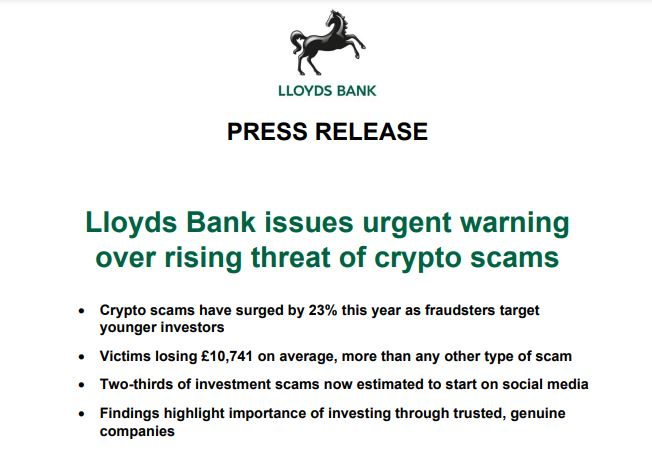- Home
- Blockchain
- Cryptic Currents: Navigating the Swell of Cryptocurrency Scams in Modern Finance
Cryptic Currents: Navigating the Swell of Cryptocurrency Scams in Modern Finance

Lloyds Bank, a venerable financial institution in the United Kingdom, has unveiled a rather disconcerting revelation, reporting a noticeable 23% upswing in cases of cryptocurrency investment scams by victims for the ongoing year, in stark contrast to the analogous period in 2022. Expressing palpable apprehension, the financial behemoth underscored the rising tide of duplicitous machinations, facilitated by an inundation of misleading advertisements permeating various social media platforms.
As delineated in the meticulously crafted press release by Lloyds Bank, an escalating cadre of investors now grapples with the looming threat of falling into the clutches of nefarious schemes, artfully executed through a deluge of spurious promotions saturating the ever-expanding realm of social media. The figures revealed are nothing short of staggering, with the average financial setback suffered by victims of cryptocurrency investment scams soaring to an alarming $13,115 (equivalent to 10,741 British pounds), a substantial leap from the preceding year's figure of $8,562 (7,010 pounds). This escalation notably eclipses losses incurred through other manifestations of consumer fraud, such as the perennially lamentable romance scams or purchase-related deceptions.
 Screenshot of the report from Lloyds Bank. Source: Lloyds Bank
Screenshot of the report from Lloyds Bank. Source: Lloyds Bank
The report illuminates a rather distressing trend: individuals within the 25–34 age bracket now constitute an imposing quarter of all victims ensnared by the web of crypto scams, firmly establishing themselves as the most extensively targeted demographic. In an intriguing twist, the criminal syndicates orchestrating these scams continually recalibrate their strategies, seizing upon emerging trends to lure an expanding cohort of unsuspecting victims who, unwittingly, part ways with their hard-earned funds. A noteworthy shift in focus is discernible as younger investors, allured by the siren call of rapid wealth accumulation through cryptocurrency trading, find themselves increasingly ensnared.
In the typical progression of events, prospective cryptocurrency investors, in a somewhat unfortunate ritual, make an average of three payments before the stark realization dawns upon them—they have become victims of a scam. Shockingly, an approximate 100 days elapse from the initial transaction date to the eventual reporting of these incidents to the respective banks. Tragically, the funds are often deemed irretrievable by this juncture, painting a bleak financial landscape for the banking institutions involved.
This disconcerting report from Lloyds Bank seamlessly dovetails with insights gleaned from a Coinbase report on the intricate cryptocurrency landscape. This secondary source indicates a heightened proclivity among younger Americans to explore unconventional avenues for achieving financial independence, with cryptocurrency occupying a prominent position in their financial considerations. This heightened susceptibility, unfortunately, renders them more vulnerable to the intricate web of scams that pervade this burgeoning sector.
In their proactive exploration of nascent economic horizons, younger generations conscientiously lay the groundwork for a system modernized and revitalized, embodying a contemporary interpretation of the hallowed "American Dream." The report, as it meticulously unfolds, underscores their perspective on technologies like cryptocurrency, portraying them as instrumental tools for ushering in a comprehensive modernization of the prevailing economic paradigm.
Read more: Cryptofluid Accord: Genesis and 3AC Settlement Unveiled Amidst Financial Currents

Trending



Press Releases

Deep Dives







